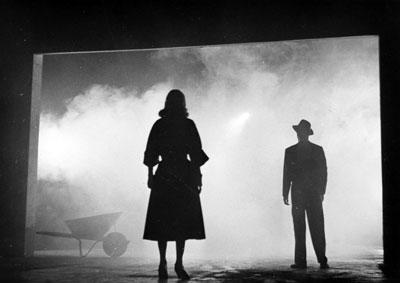Directed by Joseph Lewis
"I''m trying to run an impersonal business. Killing is very personal!"
Brazenly stylized, deeply cynical, and very funny, The Big Combo tells the story of police lieutenant Cornell Wilde's quest to uncover the secret past of a notorious mob boss while simultaneously seducing the mobster's girl. This classically noirish premise is undermined at every turn, as director Joseph Lewis (Gun Crazy) sets his film in a world where crime, romance and even mystery have become thoroughly corporatized. The cops have made the prescient discovery that the best way to tackle organized crime is through their taxman. Meanwhile, the mob has supplanted the colorful old Sicilians with a metrosexual technocrat called "Mr. Brown" who appears to be nurturing a promising second career as a motivational speaker. The terribly suave Richard Conte is most in his element when expounding that the secret to success lies not just in a good manicure, but "per-sonality!"
In his celebrated taxonomy of film noir, Paul Schrader defines the genre's third phase as a moment when directors jettisoned the romantic conventions of the '40s in favor of a "painfully self-aware" frenzy of baroque disintegration. In The Big Combo, Joseph Lewis relentlessly draws our attention to the artificiality of his medium, both in his ingeniously sadistic manipulations of diegetic sound (torture by means of hearing aid), as well as the aggressively anti-naturalistic frontality of his mise-en-scène.
The film's original tag line read, "The most startling story the screen has ever dared reveal!" For a contemporary viewer, the film's most startling effect will be the constant prickle of déjà vu we experience, a déjà vu which points back to the films of the '40s, but also, jarringly, forwards to the sadistic and self-aware cinema of Quentin Tarantino, P.T. Anderson and the Coen Brothers.
–Theresa Schwartzman
Theodora Productions, Inc./ Security Pictures, Inc./Allied Artists Producer: Sidney Harmon Screenwriter: Philip Yordan Cinematographer: John Alton Editor: Robert Eisen Music: David Raksin Cast: Cornel Wilde, Richard Conte, Brian Donlevy, Jean Wallace, Earl Holliman, Lee Van Cleef, Ted de Corsia
35mm, 88 min.
Preserved from a 35mm acetate composite fine grain master positive. Laboratory services by YCM Laboratories. Audio Mechanics. OJ Audio. Special thanks to: TV Matters.






 Mobile Navigation
Mobile Navigation

